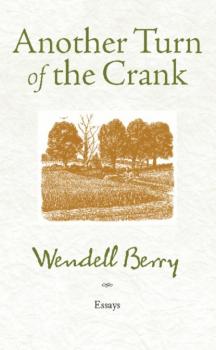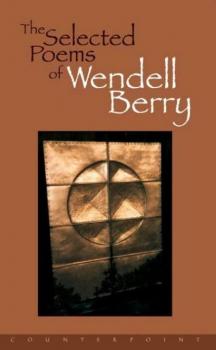ТОП просматриваемых книг сайта:
Wendell Berry
Список книг автора Wendell BerryАннотация
"A Kentucky farmer and writer, and perhaps the great moral essayist of our day, Berry has produced one of his shortest but also most powerful volumes." ― The New York Review of Books «The rarest (and highest) of literary classes consist of that small group of authors who are absolutely inimitable . . . One of the half-dozen living American authors who belongs in this class is Wendell Berry.» ― Los Angeles Times «Berry is a philosopher, poet, novelist, and an essayist in the tradition of Emerson and Thoreau . . . like Thoreau, he marches to a different drummer, a drummer we would do well to be aware of, if not to march to.» ― San Francisco Chronicle From modern health care to the practice of forestry, from local focus to national resolve, Wendell Berry argues, there can never be a separation between global ecosystems and human communities—the two are intricately connected, and the health and survival of one depends upon the other. Provocative, intimate, and thoughtful, Another Turn of the Crank reaches to the heart of Berry's concern and vision for the future, for America and for the world.
Аннотация
Ranging from America’s insatiable consumerism and household economies to literary subjects and America’s attitude toward waste, here Berry gracefully navigates from one topic to the next. He speaks candidly about the ills plaguing America and the growing gap between people and the land. Despite the somber nature of these essays, Berry’s voice and prose provide an underlying sense of faith and hope. He frames his reflections with poetic responsibility, standing up as a firm believer in the power of the human race not only to fix its past mistakes but to build a future that will provide a better life for all.
Аннотация
"The reasoned and insistent exhortations of a man with a cause who, rather than mellowing with age and wisdom, continues to grow in forcefulness and vision." — Booklist Over the years, Wendell Berry has sought to understand and confront the financial structure of modern society and the impact of developing late capitalism on American culture. There is perhaps no more demanding or important critique available to contemporary citizens than Berry's writings – just as there is no vocabulary more given to obfuscation than that of economics as practiced by professionals and academics. Berry has called upon us to return to the basics. He has traced how the clarity of our economic approach has eroded over time, as the financial asylum was overtaken by the inmates, and citizens were turned from consumers – entertained and distracted – to victims, threatened by a future of despair and disillusion. For this collection, Berry offers essays from the last twenty-five years, alongside new essays about the recent economic collapse, including “Money Versus Goods” and “Faustian Economics,” treatises of great alarm and courage. He offers advice and perspective as our society attempts to steer from its present chaos and recession to a future of hope and opportunity. With urgency and clarity, Berry asks us to look toward a true sustainable commonwealth, grounded in realistic Jeffersonian principles applied to our present day.
Аннотация
The Selected Poems of Wendell Berry gathers one hundred poems written between 1957 and 1996. Chosen by the author, these pieces have been selected from each of nine previously published collections. The rich work in this volume reflects the development of Berry’s poetic sensibility over four decades. Focusing on themes that have occupied his work for years—land and nature, family and community, tradition as the groundwork for life and culture— The Selected Poems of Wendell Berry celebrates the broad range of this vital and transforming poet.
Аннотация
Old Jack, born just after the American Civil War and dying in contemporary times, spends one beautiful September day in Port William, his home since birth, remembering. The story tells of the most searing moments of Old Jack’s life, particularly his debt to his sister Nancy and her husband Ben Feltner, Old Jack’s model of what an honorable manhood and strength might be. "Few novelists treat both their characters and their readers with the kind of respect that Wendell Berry displays in this deeply moving account . . . The Memory of Old Jack is a slab of rich Americana." — The New York Times Book Review
Аннотация
“This is a book about Heaven,” says Jayber Crow, “but I must say too that . . . I have wondered sometimes if it would not finally turn out to be a book about Hell.” It is 1932 and he has returned to his native Port William to become the town's barber. Orphaned at age ten, Jayber Crow’s acquaintance with loneliness and want have made him a patient observer of the human animal, in both its goodness and frailty. He began his search as a «pre-ministerial student» at Pigeonville College. There, freedom met with new burdens and a young man needed more than a mirror to find himself. But the beginning of that finding was a short conversation with «Old Grit,» his profound professor of New Testament Greek. "You have been given questions to which you cannot be given answers. You will have to live them out—perhaps a little at a time." «And how long is that going to take?» «I don't know. As long as you live, perhaps.» «That could be a long time.» «I will tell you a further mystery,» he said. «It may take longer.» Wendell Berry’s clear-sighted depiction of humanity’s gifts—love and loss, joy and despair—is seen though his intimate knowledge of the Port William Membership.
Информация о книге
Автор произведения Wendell Berry
Жанр Современная зарубежная литература
Серия Port William
Аннотация
Only a farmer could delve so deeply into the origins of food, and only a writer of Wendell Berry’s caliber could convey it with such conviction and eloquence. A progenitor of the slow food movement, Wendell Berry reminds us all to take the time to understand the basics of what we ingest. “Eating is an agriculture act,” he writes. Indeed, we are all players in the food economy. For the last five decades, Berry has embodied mindful eating through his land practices and his writing. In recognition of that influence, Michael Pollan here offers an introduction to this wonderful collection that is essential reading for anyone who cares about what they eat. Drawn from over thirty years of work, this collection joins bestsellers The Omnivore's Dilemma, by Pollan, and Animal, Vegetable, Miracle, by Barbara Kingsolver, as essential reading for anyone who cares about what they eat. The essays address such concerns as: How does organic measure up against locally grown? What are the differences between small and large farms, and how does that affect what you put on your dinner table? What can you do to support sustainable agriculture?
Аннотация
"Berry is a superb writer. His sense of what makes characters tick is extraordinary . . . Short stories don't get any better than these." — People As part of Counterpoint's celebration of beloved American author Wendell Berry comes this reissue of his 1986 classic, The Wild Birds: Six Stories of the Port William Membership . Those stories include «Thicker Than Liquor», «Where Did They Go?», «It Wasn't Me», «The Boundary», «That Distant Land», and the titular «The Wild Birds.» Spanning more than three decades, from 1930 to 1967, these wonderful stories follow Wheeler Catlett, and reintroduce readers to the beloved people who live in Berry's fictional town of Port William, Kentucky.
Аннотация
"Read [him] with pencil in hand, make notes, and hope that somehow our country and the world will soon come to see the truth that is told here." — The New York Times Book Review In this collection of essays, first published in 1993, Wendell Berry continues his work as one of America's most necessary social commentators. With wisdom and clear, ringing prose, he tackles head-on some of the most difficult problems which faced near the end of the twentieth-century. Berry elucidates connections between sexual brutality and economic brutality, and the role of art and free speech. He forcefully addresses America's unabashed pursuit of self-liberation, which he says is «still the strongest force now operating in our society.» As individuals turn away from their community, they conform to a «rootless and placeless monoculture of commercial expectations and products,» buying into the very economic system which is destroying the earth, our communities, and all they represent. Throughout the book Berry asks, What is appropriate? What is worth conserving from our past and preserving in our present? What is it to be human and truly connected to others? What does it mean to be free?
Аннотация
Larkspur Press (the 40+ year-old artisanal book maker based in Monterey KY) originally produced a limited run of Wendell Berry's illustrated poem, The Farm , in 1995. With this new offset printed edition from Counterpoint Press, we have reproduced that gorgeous work in a lovely, understated gift package Larkspur Press was recently featured on NPR's All Things Considered (Nov 2017) and in Garden and Gun magazine. Collectors know and love the press, and their edition of The Farm has been OP for many years The Farm is one of several works Counterpoint Press is publishing and distributing widely for the first time in the United States The perfect gift for the stalwart Wendell Berry fan, as well as for readers who love poets as varied as Mary Oliver, Frank O'Hara or Rumi Published as part of Counterpoint's commitment to ensuring Wendell Berry continues to be regarded as one of the most important voices of American letters, and to introducing his body of work to a new generation of readers










